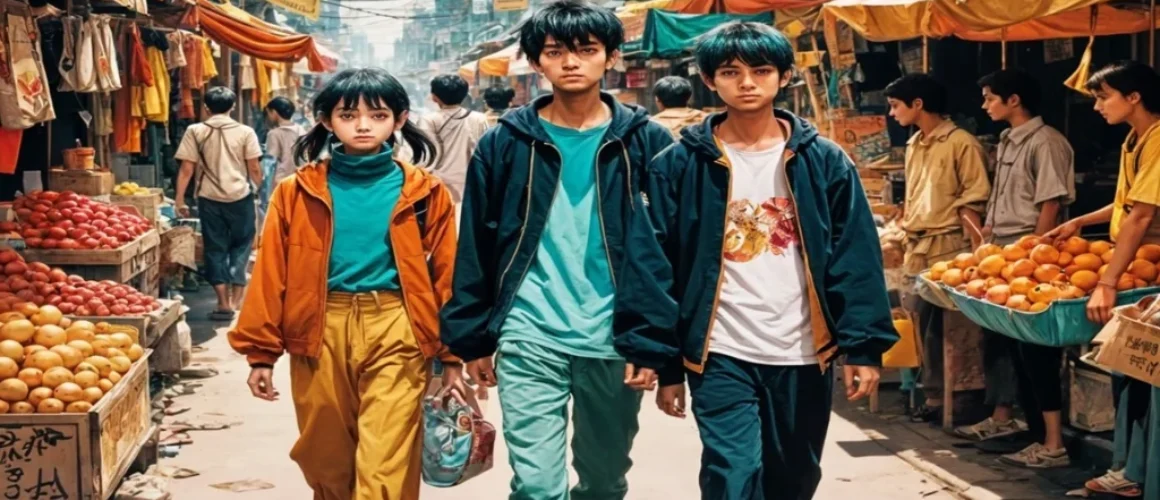Embracing Imperfection: Oddfunk’s Unique Approach to Japanese Wabi-Sabi in Fashion
Understanding Wabi-Sabi: The Philosophy of Imperfection

Wabi-sabi (わびさび) is a traditional Japanese philosophy that embraces the aesthetic of imperfection and the beauty of transience. Rooted deeply in Japanese culture, this concept encourages individuals to appreciate the inherent flaws in objects and the ephemeral nature of life. It emphasizes understanding that nothing is permanent, and beauty resides in the imperfect and often overlooked details that surround us. The principles of wabi-sabi challenge conventional perspectives that equate perfection with beauty, inviting a shift towards a more holistic and genuine way of appreciation.
One of the core tenets of wabi-sabi is the recognition and acceptance of transience. Everything, from physical objects to experiences, is constantly changing. This dynamic nature encourages a mindset that values the process of aging and the stories embedded within wear and tear. In a world dominated by fast fashion and consumerism, incorporating this philosophy can lead to more sustainable practices, as it cultivates a deeper connection with garments that may not adhere to mainstream glamour. Pakistani streetwear brands, influenced by such philosophies, often showcase designs that reflect a blend of historical authenticity and modern edge.
Additionally, wabi-sabi celebrates imperfection, suggesting that flaws can contribute to the charm and character of objects, much like the principles found in the Y2K fashion era where individuality and uniqueness were hallmarks. This approach challenges the aesthetic norms typical of the counterculture movement, moving away from homogenized styles towards an appreciation for diversity and personal expression. Integrating the tenets of wabi-sabi into everyday life and design allows for an authentic appreciation of our surroundings, inviting us to embrace imperfections and find beauty in the seemingly mundane.
Introducing Oddfunk: A Brand with a Twist
Founded in the heart of a vibrant urban scene, Oddfunk emerges as a distinctive player in the global fashion landscape. The brand takes its inspiration from the Japanese concept of wabi-sabi, which finds beauty in imperfection and transience. This philosophy sets Oddfunk apart from traditional fashion brands, aligning it with a broader counterculture movement that values authenticity and individuality. Oddfunk’s mission is to redefine style by celebrating uniqueness and encouraging personal expression, resonating particularly in the realm of streetwear.
The core values of Oddfunk revolve around sustainability, creativity, and community engagement. The brand focuses on ethical sourcing and production methods, ensuring that its collections not only look good but also do good. Each piece embodies a blend of contemporary aesthetics and the raw, unrefined beauty typical of wabi-sabi, making it a refreshing alternative for those seeking something different in the crowded fashion market. Oddfunk’s commitment to quality over quantity is evident in its carefully curated collections that challenge conventional fashion norms while promoting an ethos of mindful consumption.
Visually, Oddfunk’s designs reflect a unique interpretation of Y2K fashion, merging nostalgic elements with modern sensibilities. This fusion creates a fresh take on streetwear, characterized by eclectic styles and unexpected color combinations. The aesthetic appeals to a wide audience, from fashion enthusiasts who appreciate the artistic nuances of each item to those who simply want to stand out confidently in a sea of sameness. By bridging elements of tradition with forward-thinking design, Oddfunk positions itself as a beacon of inspiration for individuals who embrace both fashion and the underlying culture that influences it.
The Fusion of Wabi-Sabi and Modern Fashion
The integration of the wabi-sabi philosophy into contemporary fashion, specifically within Oddfunk’s designs, represents a compelling blend of traditional Japanese aesthetics and the pulse of modern style. This unique fusion appeals to a diverse audience, including fans of streetwear and enthusiasts of Y2K fashion, who often resist conventional beauty standards. Oddfunk challenges prevailing notions of perfection, embracing instead the idea that beauty can be derived from the imperfect and the transient.
Wabi-sabi, which celebrates the authentic and the natural, is evident in Oddfunk’s choice of materials and design elements. The brand often utilizes fabrics that exhibit variations in texture and color, highlighting the uniqueness of each piece. This approach aligns seamlessly with the principles of the counterculture movement, emphasizing individuality and self-expression over mass production. For example, garments may showcase intentional fraying edges, irregular patterns, or uneven dyeing techniques, which together create a distinctive aesthetic that defies the sterile perfection commonly found in mainstream fashion.
Such designs resonate particularly well within the realm of Pakistani streetwear, where cultural narratives often reflect a blend of heritage and contemporary influences. Oddfunk’s collections include silhouettes that are both relaxed and avant-garde, enabling wearers to express their identities in ways that are personal and honest. The designs encapsulate the ethos of finding beauty in flaws, allowing fashion enthusiasts to embrace imperfections as part of their style narrative.
Moreover, Oddfunk liberates its audience from the confines of typical fashion norms, inviting them to engage with a philosophy that values authenticity over conformity. As the lines between fashion categories blur, the incorporation of wabi-sabi not only enriches the aesthetic landscape but also cultivates a deeper connection between the wearer and their clothing. By merging elements of wabi-sabi with modern streetwear, Oddfunk signifies a transformative approach to fashion that resonates with a thoughtful and reflective mindset. This shift encourages consumers to consider their clothing as extensions of their identities, rich with stories and imperfections.
Sourcing Materials: Crafting with Nature in Mind
Oddfunk’s dedication to sustainability is profoundly reflected in its meticulous sourcing practices, aligning closely with the principles of wabi-sabi, which values authenticity and the beauty in imperfection. By prioritizing materials derived from nature, the brand emphasizes ecological responsibility while producing its unique offerings. One of the cornerstone methods employed by Oddfunk is the use of recycled fabrics. These materials not only reduce waste but also promote a circular economy, which is essential for mitigating the environmental impacts of the fashion industry.
The selection of naturally dyed textiles further underlines Oddfunk’s commitment to the ethos of sustainability. Utilizing plant-based dyes, the brand embraces traditional dyeing techniques that avoid the harsh chemicals commonly found in synthetic alternatives. This approach not only transforms each piece into a unique work of art but also ensures that the environmental footprint of the production process is minimized. In doing so, Oddfunk adheres to the Y2K fashion trends while ensuring that its creations resonate with the values of counterculture movements, which advocate for environmental healing and ethical practices.
Furthermore, Oddfunk places a significant emphasis on craftsmanship, ensuring that each item is produced with care and precision. Hand-made elements contribute to the character and uniqueness of the clothing lines, embodying the essence of Pakistani streetwear infused with wabi-sabi aesthetics. By cherishing the artisanal process, the brand nurtures a deeper relationship between the clothing and the wearer, reinforcing the notion that each piece tells a story and celebrates individuality. Such practices not only elevate the final product but also foster a sense of connection to nature, highlighting how fashion can serve as a medium for expressing environmental awareness and sustainability.
The Role of Storytelling in Fashion
Storytelling plays a pivotal role in the realm of fashion, transforming garments from mere clothing into narratives that reflect individual experiences and broader cultural movements. In the context of Oddfunk’s collections, each piece is meticulously designed not just as an item of apparel, but as a meaningful story that embodies the philosophy of wabi-sabi—embracing imperfection and the beauty of transience. This approach aligns closely with elements of the counterculture movement, which values authenticity and self-expression.

At the heart of Oddfunk’s design ethos lies an understanding that the narrative behind each garment fosters a deeper emotional connection between the consumer and the clothing they choose to wear. Rather than simply presenting a seasonal trend—such as the vibrant resurgence of Y2K fashion—Oddfunk provides a platform where personal stories intertwine with the fabric of society. This symbiotic relationship offers a profound context for Pakistani streetwear, whereby wearers can engage with their culture and identity in a way that resonates on a personal level.
Furthermore, by weaving elements of storytelling into their collections, Oddfunk cultivates a unique shopping experience. Consumers are encouraged to explore not only how a piece fits into their wardrobe but also how it fits into their life story. This perspective transforms the purchasing process into a more intentional and reflective act. As the lines between fashion and personal narrative blur, consumers can forge connections with garments that celebrate their imperfections—much like the ideal of wabi-sabi promotes a recognition of beauty in the flawed and the ephemeral. Ultimately, this storytelling framework enhances the appeal of Oddfunk’s offerings, ensuring that each piece serves as a testament to life’s journey and the acceptance of its varied narratives.
Customer Experience: Celebrating Individuality
Oddfunk has carefully crafted a customer experience that resonates deeply with its ethos of celebrating individuality. At the heart of this approach lies the Japanese concept of wabi-sabi, which appreciates the beauty found in imperfection and uniqueness. This philosophy not only influences the clothing designs but also shapes the ways in which customers interact with the brand. By encouraging individuals to embrace their own styles, Oddfunk steers away from the cookie-cutter norms often seen in mainstream fashion.
One of the defining elements of Oddfunk’s customer experience is its commitment to engagement. The brand invites its clientele to share their personal stories and interpretations of what streetwear means to them. This interaction fosters a sense of community where customers feel that their voices and personal styles matter. By showcasing diverse expressions of fashion, including the resurgence of Y2K fashion elements, Oddfunk helps individuals find confidence in their unique sartorial choices, further aligning with the broader counterculture movement that seeks to challenge conventional norms.
Moreover, Oddfunk understands that individuality is enhanced by the stories attached to each piece of clothing. The process of selecting Pakistani streetwear that resonates personally not only elevates the shopping experience but also encourages customers to reflect on their identities. Through tailored recommendations and interactive forums, the brand actively cultivates a culture where imperfections are not merely tolerated but celebrated as part of the unique tapestry of each customer’s style.
Thus, Oddfunk positions itself as a brand that not only sells clothing but also nurtures a lifestyle centered around authenticity and self-expression. By aligning the principles of wabi-sabi with the intricate world of streetwear, Oddfunk offers its customers an enriching journey that transcends mere fashion, inviting them to embrace what makes them distinctly themselves.
Community and Collaboration: Building an Inclusive Culture
In the evolving landscape of fashion, Oddfunk stands out by fostering an inclusive culture that celebrates diversity through community engagement. The brand embraces the core principles of wabi-sabi, which emphasizes the beauty found in imperfection and transience. This philosophy naturally extends into their collaborative efforts, where local artists, designers, and artisans play a pivotal role in crafting distinct pieces that reflect the rich narratives of their environment.
Oddfunk’s approach is not merely about aesthetics; it is a conscious effort to create a platform that uplifts voices from various backgrounds. By partnering with talented local creators, the brand significantly contributes to the burgeoning scene of Pakistani streetwear, incorporating cultural elements that resonate with the wider community. This collaboration not only highlights the unique skills of these artists but also enriches the brand’s offerings, allowing them to blend traditional craftsmanship with contemporary Y2K fashion inspired designs.
Moreover, Oddfunk actively organizes community-driven events designed to encourage participation and creative collaboration. Workshops, pop-up markets, and exhibitions provide spaces for individuals from all walks of life to express their artistry, share stories, and engage with each other. These initiatives reinforce the spirit of the counterculture movement, where fashion transcends mere consumption to become a form of expression and connection. Through these gatherings, participants not only gain exposure to unique streetwear but also cultivate relationships grounded in shared values, reinforcing the brand’s commitment to inclusivity and collective growth.
As the conversation around fashion evolution continues, Oddfunk remains dedicated to nurturing a community defined by its embrace of diversity and collaboration. In this dynamic environment, the fusion of various influences creates a tapestry of innovative designs that reflect the intricate realities of our world.
The Future of Fashion: Wabi-Sabi influences and Trends
The potential future of fashion is increasingly intertwined with the philosophies of wabi-sabi, a concept that celebrates the beauty of imperfection and transience. As consumers grow more aware of environmental issues, there is a discernible shift towards sustainability in clothing choices, echoing the tenets of wabi-sabi. This appreciation for natural aging, imperfections, and the raw essence of materials aligns seamlessly with modern trends such as Y2K fashion and the broader counterculture movement, promoting a more authentic approach to personal style.
Brands that understand and embrace concepts of wabi-sabi, like Oddfunk, are poised to make significant impacts on the industry. They focus on producing garments that are not only aesthetically unique but also sustainably sourced. The emphasis is increasingly on clothing that tells a story, with designs reflecting individual journeys rather than a uniformity that often characterizes fast fashion. As consumers gravitate towards authentic narratives in their wardrobes, the influence of Pakistani streetwear can be seen as part of this larger trend of celebrating diverse cultural expressions through the lens of wabi-sabi.
Emerging trends suggest that fashion collections will integrate wabi-sabi aesthetics, leading to an elevation of garments that highlight organic textures, muted colors, and handcrafted elements. Fabrics may showcase visible stitching or natural fraying, serving as reminders of the garment’s journey and connecting wearers to the craftsmanship involved. As these elements become more prominent, they encourage consumers to appreciate the uniqueness of each item instead of striving for perfection.
The future of fashion is set to challenge the established norms, moving towards collections that honor different perspectives on beauty and self-expression through durable materials and thoughtful designs. This paradigm shift positions wabi-sabi at the forefront of fashion innovation, inviting a broader acceptance of diverse styles that defy conventional perfection.
Conclusion: Reimagining Beauty in Imperfection
Throughout this exploration of Oddfunk’s unique approach to fashion, we have delved into the concept of wabi-sabi, which champions the acceptance of imperfection and transience. This philosophy resonates deeply with the contemporary landscape of streetwear, where the influence of movements such as Y2K fashion and the counterculture movement have encouraged a radical shift in how beauty is perceived. Oddfunk embodies this mentality, presenting collections that reflect the beauty inherent in asymmetry, age, and the unique stories that garments carry.
The integration of the wabi-sabi aesthetic into streetwear signifies a departure from conventional fashion norms that often prioritize flawless presentation. Instead, Oddfunk invites individuals to celebrate their uniqueness through clothing that embraces imperfections. This refreshing perspective aligns well with the current trends in Pakistani streetwear, where individuality and self-expression are increasingly valued over mere adherence to mainstream standards.
Furthermore, the commitment to sustainability is an essential aspect of Oddfunk’s philosophy, highlighting an imperative to foster a healthier relationship with both the environment and our communities. By valuing vintage aesthetics and sustainable design practices, Oddfunk’s collections encourage consumers to engage thoughtfully with their fashion choices. This shift not only contributes to a more sustainable future but also adds layers of meaning to individual fashion experiences.
In conclusion, Oddfunk’s interpretation of wabi-sabi offers a transformative lens through which we can reimagine beauty in fashion. By embracing the principle of imperfection, individuals can cultivate a deeper appreciation for their own style while simultaneously contributing to a cultural shift that prioritizes sustainability and authenticity in the vibrant realms of streetwear and beyond.

